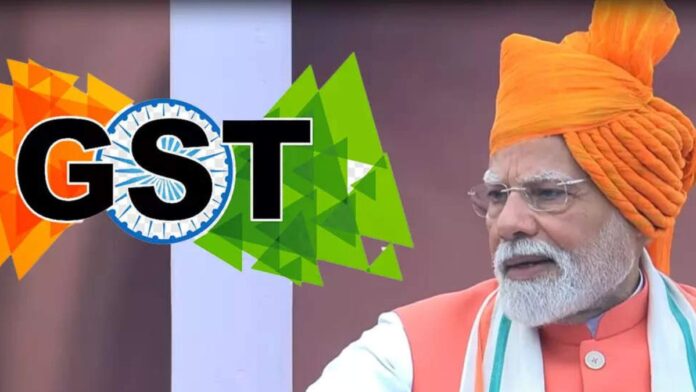Paromita Das
New Delhi, 22nd September: Whenever Prime Minister Narendra Modi takes to the stage or addresses the nation, the air is filled with anticipation. His speeches, whether from the Red Fort on Independence Day or in sudden surprise addresses, have often carried life-changing implications for the citizens of Bharat. The memory of his late-evening demonetisation announcement in 2016 still lingers, when in a matter of minutes, people learned that their ₹500 and ₹1000 notes would no longer be legal tender. That declaration shocked the nation, but it also paved the way for a new financial landscape, one that accelerated Bharat’s shift toward digital payments. Similarly, during the COVID-19 pandemic, when Modi announced a 21-day lockdown, his words carried the gravity of the moment, underscoring the importance of decisive governance.
As Modi prepares for yet another address, coinciding with the rollout of new GST reforms, the nation once again holds its breath. The significance of GST in Bharat’s economic journey cannot be overstated. It was not merely another tax reform but a structural transformation designed to untangle decades of inefficiency and lay the foundation for a unified, transparent, and citizen-first economy.
The Need for GST: From Chaos to Clarity

Before the introduction of the Goods and Services Tax in July 2017, Bharat’s tax system resembled a patchwork quilt. Every state levied its own taxes, and citizens were subject to multiple overlapping duties ranging from excise and service tax to VAT and entry levies. This system was confusing, inconsistent, and deeply inefficient. A product manufactured in one state and sold in another often had to pass through layers of taxation, inflating costs for both businesses and consumers.
GST emerged as a unifying force in this fragmented landscape. By merging multiple taxes into a single framework, it created a common market where goods and services could move seamlessly across state borders. This not only simplified compliance for businesses but also brought relief to consumers who could now see clearly how much tax they were paying on a product. The slogan “One Nation, One Tax” captured the essence of this reform — a step toward economic unity and fairness.
A Reform Rooted in Citizen-Centric Governance

What makes GST more than a technical tax reform is the philosophy that underpins it. Prime Minister Modi has repeatedly emphasized the idea of “Nagarik Devo Bhava” — the belief that the citizen is at the heart of governance, almost sacred in the democratic framework. GST reflects this ethos in profound ways. It empowers citizens by ensuring transparency in every transaction, allowing them to know exactly what portion of their payment goes to taxes. It makes life easier for both individuals and businesses by cutting down the time, effort, and money previously wasted on multiple filings and bureaucratic hurdles. Most importantly, it brings millions of small traders and enterprises into the formal economy, granting them access to loans, digital tools, and a level playing field in the national marketplace.
This vision of empowerment aligns perfectly with Modi’s larger narrative of a New Bharat — one that is efficient, inclusive, and driven by the collective strength of its people.
The Economic Impact of GST

Over the years, GST has begun to deliver on its promise of reshaping Bharat’s economic fabric. By digitizing tax compliance and bringing transactions into the formal economy, it has reduced avenues for corruption and tax evasion. The logistics sector, which once suffered from endless state border checks, has gained remarkable efficiency, cutting travel times and costs for transporters and ultimately lowering the price burden on consumers.
At the same time, GST has reassured global investors who prefer predictable and transparent tax regimes. For multinational companies weighing whether to expand operations in Bharat, the simplification of taxes has been a major confidence booster. While initial hiccups such as multiple tax slabs sparked criticism, the government’s willingness to make adjustments and refinements has kept the reform dynamic and responsive to public feedback.
A Blessing in Disguise

No reform of such magnitude comes without challenges. For many small businesses, the transition to GST was initially daunting, with compliance requirements that seemed overwhelming. Critics also argued that the presence of multiple tax slabs diluted the purity of the “one tax” idea. Yet these hurdles, while real, must be seen as part of a larger learning curve. GST is not static; it is an evolving system that continues to adapt to the needs of businesses and citizens alike.
In my view, GST should be seen as a blessing in disguise. While its early days brought disruption and confusion, its long-term benefits are now visible. The reform has expanded the tax base, streamlined processes, and contributed to Bharat’s digital transformation. Its alignment with Modi’s vision of “Nagarik Devo Bhava” ensures that it is not simply a revenue mechanism, but a tool for building trust between the state and its people.
GST as a Living Reform
As the nation awaits Prime Minister Modi’s next words, the story of GST reminds us that true reform is not about perfection on day one but about persistence and adaptability. GST has proven itself to be a living reform, constantly evolving through dialogue, policy adjustments, and citizen feedback. More than a tax, it represents a bridge between the government and the governed, built on the foundation of transparency, fairness, and efficiency.
In the final analysis, GST will be remembered as more than just a fiscal policy. It will stand as a symbol of Bharat’s determination to modernize, to unify, and to empower its citizens in line with the principle of “Nagarik Devo Bhava.” For a country striving to become a $5 trillion economy, GST is not merely a reform — it is a blessing, guiding Bharat toward a future of prosperity and shared growth.
The post GST: A Transformative Blessing for Bharat’s Economy and People appeared first on Global Governance News- Asia's First Bilingual News portal for Global News and Updates.



